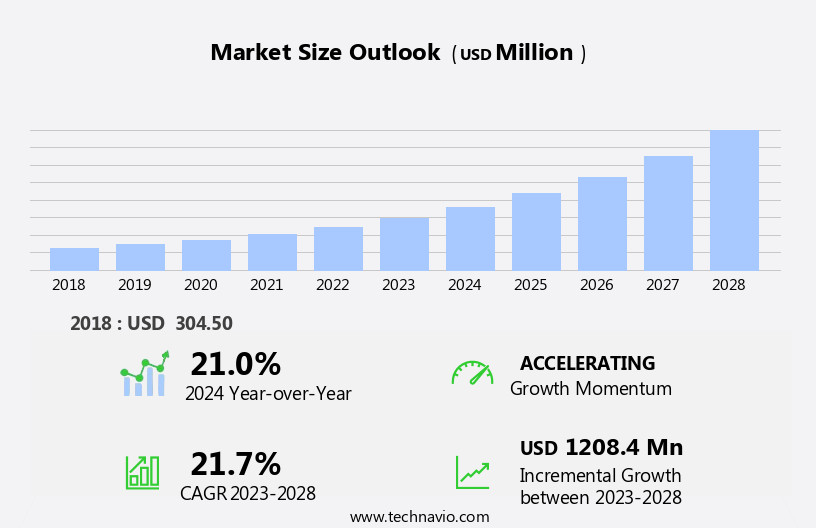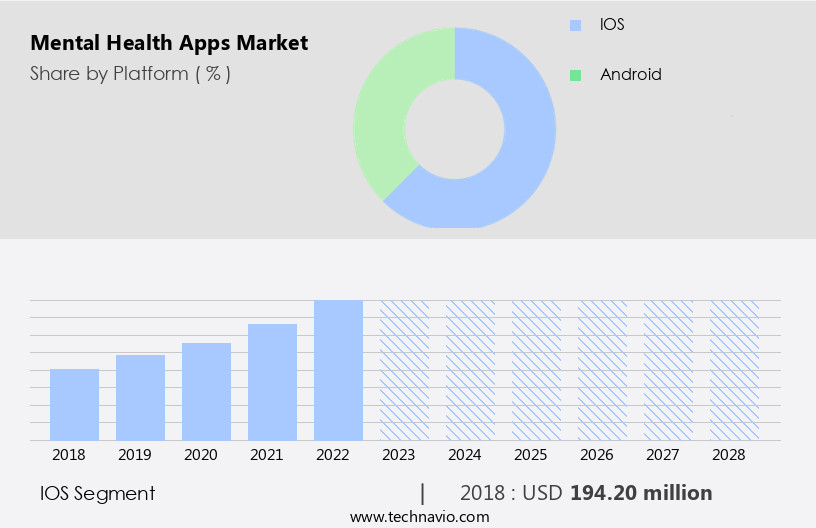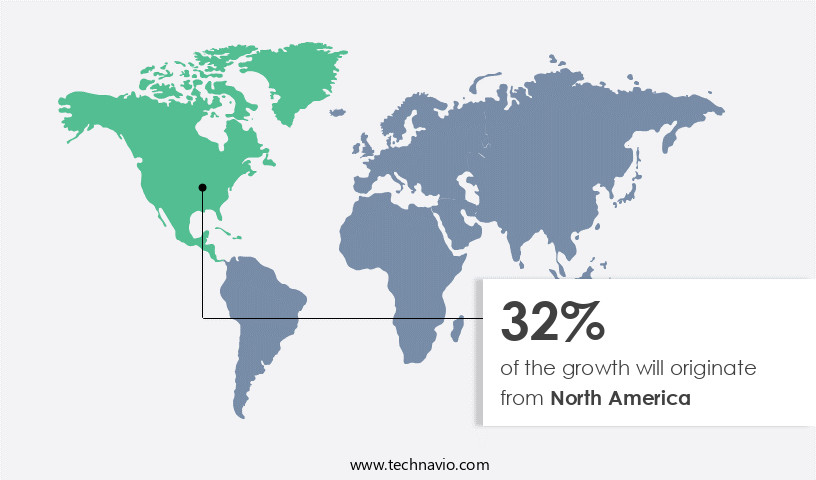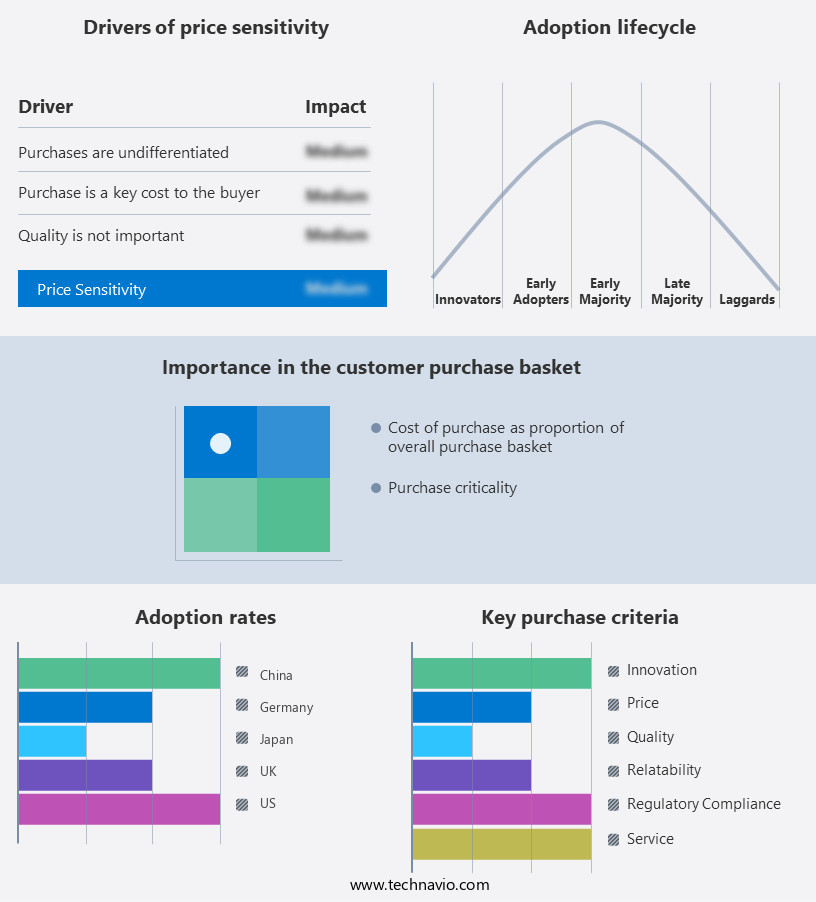Mental Health Apps Market Size 2025-2029
The mental health apps market size is forecast to increase by USD 6.87 billion at a CAGR of 14.3% between 2024 and 2029.
- The market is experiencing significant growth, driven primarily by the increasing prevalence of mental health disorders worldwide. Wearable sensors and biometric monitoring provide real-time health data, enhancing personalized therapy. The rise in mental health issues, fueled by stressful lifestyles, societal pressures, and other factors, has led to a rise in demand for accessible and convenient mental health solutions. Technological advancements have enabled the development of mental health apps, offering users a range of features designed to manage and improve their mental wellbeing. However, the market faces challenges that require careful navigation.
- Privacy and security concerns associated with the use of mental health apps remain a significant obstacle. Users share sensitive information with these applications, and ensuring data protection is essential to build trust and maintain user engagement. Companies must prioritize robust security measures and transparent data handling practices to address these concerns and capitalize on the market's potential. Companies are integrating advanced technologies such as CRM, text, and video-based therapy, as well as end-to-end patient engagement using AI and ML.
What will be the Size of the Mental Health Apps Market during the forecast period?
Explore in-depth regional segment analysis with market size data - historical 2019-2023 and forecasts 2025-2029 - in the full report.
Request Free Sample
The market is witnessing significant advancements, integrating various features to cater to diverse user needs. Communication skills training apps are gaining traction, offering interactive content and analytics dashboards to help users improve their interpersonal skills. Gamified challenges and reward systems motivate users to engage in regular breathing exercises and progress visualization, enhancing emotional regulation and problem-solving skills. A/B testing and user feedback analysis are essential components, enabling developers to personalize recommendations based on individual user preferences. Crisis management and suicide prevention apps offer peer support, doctor referrals, and feedback mechanisms, ensuring timely intervention during critical situations.
Cognitive restructuring and habit formation apps employ progressive muscle relaxation techniques and goal setting to help users develop better problem-solving skills and emotional resilience. Behavioral activation and community building features foster a supportive environment, while guided imagery and mindfulness exercises contribute to overall mental well-being. Pharmaceutical integrations and family therapy options further expand the scope of mental health apps, addressing a broader range of mental health concerns and offering comprehensive solutions for business readers.
How is this Mental Health Apps Industry segmented?
The mental health apps industry research report provides comprehensive data (region-wise segment analysis), with forecasts and estimates in "USD million" for the period 2025-2029, as well as historical data from 2019-2023 for the following segments.
- Platform
- Android
- iOS
- Type
- Monthly subscription
- Yearly subscription
- Application
- Depression and anxiety management
- Meditation management
- Stress management
- Wellness management
- Others
- Geography
- North America
- US
- Canada
- Europe
- France
- Germany
- Italy
- UK
- APAC
- China
- India
- Japan
- South Korea
- Rest of World (ROW)
- North America
By Platform Insights
The android segment is estimated to witness significant growth during the forecast period. The market on the Android platform experiences significant growth due to its widespread adoption and affordability. With a substantial user base in both emerging and developed economies, Android's mental health apps cater to a diverse demographic, featuring user-friendly interfaces and multilingual support. Developers capitalize on the platform's flexibility to integrate various mental health solutions, such as mood tracking, guided meditation, cognitive behavioral therapy (CBT) tools, and AI-driven chat support. Content marketing strategies are employed to increase mental health literacy and promote emotional well-being. Trauma therapy and stress management apps use machine learning and artificial intelligence to personalize treatment plans, while behavioral tracking and symptom monitoring enable progress tracking and performance optimization.
HIPAA and GDPR compliance ensure data security and privacy. Monetization strategies include in-app purchases, subscription models, and advertising revenue, with push notifications and API development for seamless integration with other apps. Mental wellness apps also address specific conditions like depression, anxiety, and eating disorders, offering medication reminders, journaling features, and user reviews for cross-platform compatibility and social media marketing. Personalization algorithms and recommendation engines cater to individual needs, while data analytics and data encryption ensure data security and privacy.
Stigma reduction initiatives and relaxation techniques further enrich the market, fostering a more inclusive and supportive digital mental health ecosystem.
The Android segment was valued at USD 2.68 billion in 2019 and showed a gradual increase during the forecast period.
The Mental Health Apps Market is witnessing accelerated growth, driven by rising awareness and technological breakthroughs. Central to this evolution is depression management, with apps offering personalized support and guided therapies. At the heart of these solutions lies innovative mobile app development, empowering users with 24/7 access to mental wellness tools. The integration of Artificial Intelligence (AI) and Machine Learning (ML) enhances user experiences through adaptive learning and predictive mood tracking. New technologies like Virtual Reality (VR) and Augmented Reality (AR) are transforming therapy, offering interactive environments for stress relief and cognitive training. This fusion of advanced tech and emotional support is redefining how individuals manage mental health, making care more accessible, engaging, and tailored than ever before.
Regional Analysis
North America is estimated to contribute 33% to the growth of the global market during the forecast period. Technavio's analysts have elaborately explained the regional trends and drivers that shape the market during the forecast period.
In the market, North America holds a substantial share due to high smartphone usage, increasing mental health awareness, and the acceptance of digital health solutions. The region's well-established digital infrastructure and receptive consumer base make it an ideal market for mobile mental health applications. Anxiety, depression, PTSD, and sleep disorders are among the conditions managed through these apps, offering users accessible and stigma-free support. The US and Canada host numerous app developers and mental health startups, resulting in a diverse array of offerings. These range from guided therapy sessions to AI-driven mood tracking tools, machine learning algorithms, and biometric monitoring.
Monetization strategies include in-app purchases, subscription models, and advertising revenue. Data analytics, data encryption, and HIPAA compliance ensure user privacy and data security. Personalization algorithms, medication reminders, journaling features, and user reviews cater to individual needs. Cross-platform compatibility, group therapy, and virtual reality treatments expand the market's reach. Mental wellness, stress management, behavioral tracking, and GDPR compliance are essential features. AI, ML, and AR technologies are integrated for personalized therapy, relaxation techniques, and mindfulness meditation. Eating disorder treatment and addiction treatment are also addressed through these apps. Content marketing, social media marketing, and email marketing are employed for user engagement.
Market Dynamics
Our researchers analyzed the data with 2024 as the base year, along with the key drivers, trends, and challenges. A holistic analysis of drivers will help companies refine their marketing strategies to gain a competitive advantage.
What are the Mental Health Apps market drivers leading to the rise in the adoption of Industry?
- The increasing prevalence of mental health disorders serves as the primary catalyst for market growth in this sector. Mental health apps have gained significant traction due to the increasing prevalence of mental health disorders worldwide. According to recent research, conditions such as depression, anxiety, schizophrenia, alcohol addiction, bipolar disorder, PTSD, substance abuse disorders, and eating disorders are common in regions like North America and Europe. According to Sensor Tower, mental health apps have seen a considerable rise in utilization, reflecting the importance of patient-centric, personalized care in mental health treatment.
- These apps provide stress management tools, behavioral tracking, GDPR compliance, artificial intelligence, sleep disorders treatment, addiction treatment, data analytics, virtual reality, and online therapy. By leveraging these features, mental health apps aim to offer effective and accessible solutions for individuals dealing with mental health challenges. Countries including Ukraine, the US, Estonia, Greece, Portugal, Belarus, and Finland have particularly high rates of depression. To address this need, mental health apps offer various features such as group therapy, biometric monitoring, machine learning, and monetization strategies.
What are the Mental Health Apps market trends shaping the Industry?
- Mental health apps are experiencing significant technological advancements, making them the emerging trend in the market. This sector's growth is driven by continuous innovation and development. The market is witnessing significant technological advancements as leading players prioritize innovation to cater to consumer demands and enhance competitiveness. For example, BetterHelp, a teletherapy platform, has incorporated AI-based therapist matching to help users find the most suitable therapist for their needs.
- Data encryption ensures user privacy and security, while medication reminders and social media marketing help increase engagement and reach. Advertising revenue and API partnerships are additional revenue streams for mental health app developers. Another trend gaining traction is the use of wearable sensors for monitoring mental health indicators, such as heart rate variability and sleep patterns. In-app purchases, subscription models, push notifications, API development, and personalization algorithms are also common features in mental health apps, providing users with customized treatment plans for conditions like depression and eating disorders.
How does Mental Health Apps market face challenges during its growth?
- The mental health app industry faces significant growth challenges due to privacy and security concerns surrounding user data protection. These concerns, which are of paramount importance to both users and regulators, must be addressed through robust data security protocols and transparent data handling practices to build trust and ensure the industry's continued growth. The market faces critical challenges related to privacy and security, as these applications handle sensitive user information. With the collection of health data and location details, concerns regarding data usage and accessibility have arisen.
- User reviews and ratings, cross-platform compatibility, personalized therapy, and features such as journaling, relaxation techniques, mindfulness meditation, recommendation engines, and email marketing can help differentiate apps in the market. Maintaining data security while providing these features is essential for mental health app success. Notable data breaches and privacy violations in the industry have eroded public trust, emphasizing the significance of data privacy and security. To mitigate these issues, mental health app developers and providers must implement robust security measures. This includes strong data encryption, secure data storage, and clear privacy policies and consent processes.
Exclusive Customer Landscape
The mental health apps market forecasting report includes the adoption lifecycle of the market, covering from the innovator's stage to the laggard's stage. It focuses on adoption rates in different regions based on penetration. Furthermore, the mental health apps market report also includes key purchase criteria and drivers of price sensitivity to help companies evaluate and develop their market growth analysis strategies.
Customer Landscape
Key Companies & Market Insights
Companies are implementing various strategies, such as strategic alliances, mental health apps market forecast, partnerships, mergers and acquisitions, geographical expansion, and product/service launches, to enhance their presence in the industry.
7 Cups of Tea Co. - The company specializes in Mental Health Apps and is a leading provider of digital mental health solutions, offering apps like 7 Cups that connect individuals with trained listeners for emotional support.
The industry research and growth report includes detailed analyses of the competitive landscape of the market and information about key companies, including:
- 7 Cups of Tea Co.
- American Well Corp.
- BetterHelp
- Calm.com Inc.
- CVS Health Corp.
- Flow Neuroscience AB
- Glucobit Inc.
- Happify Inc.
- Headspace Inc.
- MassiveMusic
- MoodMission Pty Ltd.
- Moodtools
- NOCD Inc.
- Roble Ridge Software LLC
- Sanvello Health Inc.
- TALKSPACE INC.
- Thrive Therapeutic Software Ltd.
- ustwo Ltd.
- Women LLC
- Youper Inc.
Qualitative and quantitative analysis of companies has been conducted to help clients understand the wider business environment as well as the strengths and weaknesses of key industry players. Data is qualitatively analyzed to categorize companies as pure play, category-focused, industry-focused, and diversified; it is quantitatively analyzed to categorize companies as dominant, leading, strong, tentative, and weak.
Recent Development and News in Mental Health Apps Market
- In January 2024, Happify, a leading mental health app, announced the launch of its new feature, "Mood Match," which uses artificial intelligence to suggest personalized activities based on users' emotions (Happify Press Release).
- In March 2024, Teladoc Health and Headspace, a digital health and mindfulness app, entered into a strategic partnership to integrate Headspace's content into Teladoc's virtual care platform, reaching over 50 million members (Teladoc Health Press Release).
- In April 2025, Calm, a popular meditation and sleep app, secured a USD175 million funding round, bringing its total funding to over USD300 million, to expand its offerings and reach more users (Calm Press Release).
- In May 2025, the U.S. Food and Drug Administration (FDA) cleared WW (formerly Weight Watchers)'s digital mental health program, "WW Mind," for use in treating depression and anxiety, marking the first digital therapeutic cleared for these conditions without requiring a prescription (WW Press Release).
Research Analyst Overview
The market continues to evolve, integrating various technologies and applications to address diverse mental health needs. Patient engagement is a key focus, with emotional well-being apps offering trauma therapy, mental health literacy, anxiety management, and exposure therapy. Symptom monitoring and progress tracking are facilitated through biometric monitoring, machine learning, and artificial intelligence. Monetization strategies include in-app purchases, subscription models, and advertising revenue, while push notifications and API development enable personalized therapy and user engagement. Eating disorder treatment, sleep disorders treatment, addiction treatment, and stress management are among the sectors benefiting from these advancements. Content marketing, performance optimization, and virtual assistants are essential for user acquisition and retention.
Data analytics and data security are crucial for ensuring HIPAA and GDPR compliance. Group therapy, behavioral tracking, and relaxation techniques are also integrated into these apps, providing a holistic approach to mental wellness. Augmented reality and virtual reality offer innovative solutions for trauma therapy and mindfulness meditation. Recommendation engines and email marketing help personalize the user experience. Medication reminders and journaling features contribute to overall mental health management. The market's continuous dynamism is reflected in the integration of wearable sensors, personalization algorithms, and data encryption. User reviews and cross-platform compatibility further enhance the user experience. The ongoing unfolding of market activities underscores the importance of staying informed and adaptive in this evolving landscape.
Dive into Technavio's robust research methodology, blending expert interviews, extensive data synthesis, and validated models for unparalleled Mental Health Apps Market insights. See full methodology.
|
Market Scope |
|
|
Report Coverage |
Details |
|
Page number |
208 |
|
Base year |
2024 |
|
Historic period |
2019-2023 |
|
Forecast period |
2025-2029 |
|
Growth momentum & CAGR |
Accelerate at a CAGR of 14.3% |
|
Market growth 2025-2029 |
USD 6.87 billion |
|
Market structure |
Fragmented |
|
YoY growth 2024-2025(%) |
12.1 |
|
Key countries |
US, Germany, China, UK, Japan, Canada, India, France, Italy, and South Korea |
|
Competitive landscape |
Leading Companies, Market Positioning of Companies, Competitive Strategies, and Industry Risks |
What are the Key Data Covered in this Mental Health Apps Market Research and Growth Report?
- CAGR of the Mental Health Apps industry during the forecast period
- Detailed information on factors that will drive the growth and forecasting between 2025 and 2029
- Precise estimation of the size of the market and its contribution of the industry in focus to the parent market
- Accurate predictions about upcoming growth and trends and changes in consumer behaviour
- Growth of the market across North America, Europe, APAC, South America, and Middle East and Africa
- Thorough analysis of the market's competitive landscape and detailed information about companies
- Comprehensive analysis of factors that will challenge the mental health apps market growth of industry companies
We can help! Our analysts can customize this mental health apps market research report to meet your requirements.




